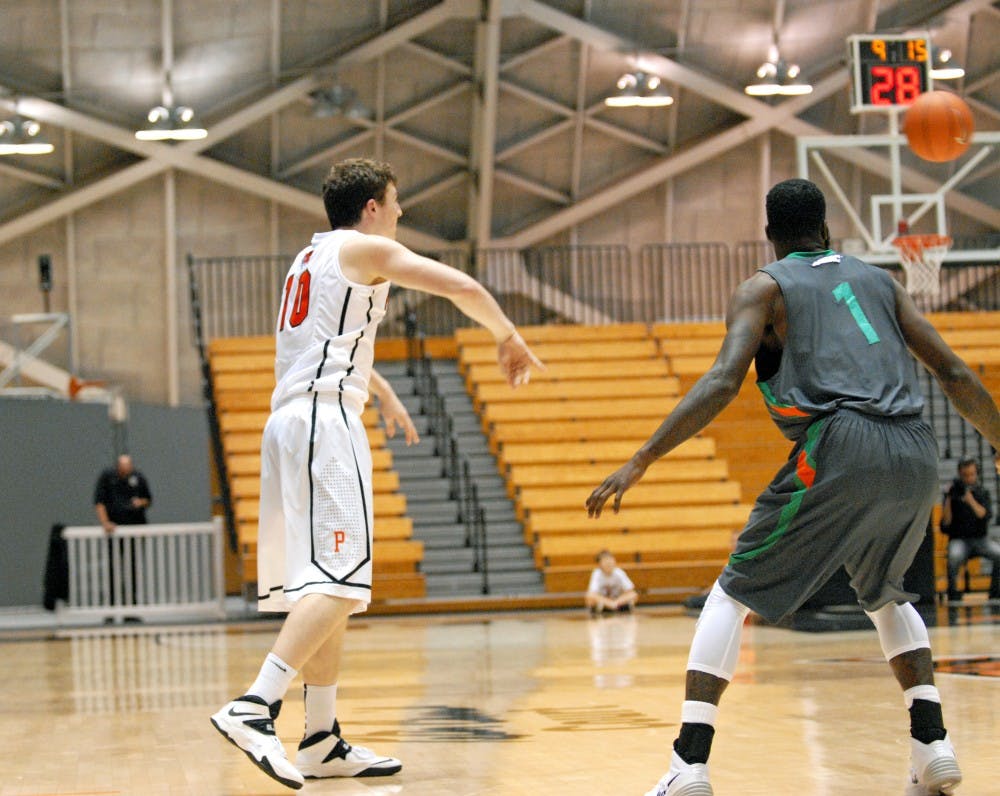At big time college programs, there is plenty for an incoming freshman athlete to be worried about. Aside from concerns every freshman has, an athlete needs to adjust to a new system as well as more time constraints than he has ever faced before. Indeed, there are some (albeit few) who would like to have freshmen be ineligible for NCAA competition their first year on campus, allowing them to play only after spending a year adjusting to both new surroundings and new systems.
Of course, fewer people think about these issues these days, when we regularly see freshmen fill in key roles on strong teams. Andrew Wiggins, Jabari Parker and every freshman the University of Kentucky has put on the court in the past few years are all prime examples. Closer to home, one can look at the freshman season of Ian Hummer ’13 (6.9 points, 3.1 rebounds, 18.6 minutes per game) and freshman forward Spencer Weisz’s first two games of the season (7 points, 5.5 rebounds and 3.5 assists in 32 minutes per game).
It may come as a surprise to some to learn that there was a time when the aforementioned concerns prevented freshmen from playing at all. Last year was the 40th anniversary of the NCAA’s repeal of its no-freshmen policy. Until 1972, all incoming freshmen were required to play a year on freshman-only teams before entering the ranks of the varsity squad. The NCAA had permitted the participation of freshmen in all sports save football, crew and basketball eight years before, but, cognizant of the financial pressures of supporting multiple teams for a single sport, it finally decided to permit freshmen play unilaterally.
The decision was not well received by Princeton athletics or by the Ivy League as a whole. Head basketball coach Pete Carril saw the decision as “accelerat[ing] the excess amount of male prostitution already going on in most athletic departments.” Many at Princeton had opinions similar to Carril’s — though they may not have phrased them quite as harshly — prompting then-athletic director R. Kenneth Fairman to say, “I don’t think the Ivy League will change its position in the near future.”
And that was the case. The Ivy League maintained its staunch position against freshman eligibility until it faced a two-part dilemma: the decreasing quality of play of Ivy League basketball itself and the increasing financial burden of supporting freshman and varsity teams. In 1974, no Ivy League team received votes for a place in the top 25 by the end of the season — something that was unusual for the time.
By 1975, the University was reluctantly beginning to take measures to cut freshman teams in order to decrease costs, though still avoiding freshman entry into basketball, football and men’s crew. As to why these particular sports were still to be upperclassmen-only, then-associate athletic director Sam Howell ’50 said that “the psychic pressure characteristic of a highly publicized sport … is too much for freshmen at an academic institution like the Ivy League.”
It seems that such opinions were hard to shake among the higher-ups of Princeton athletics. It was believed that the issue of freshman eligibility in Princeton basketball would be resolved as soon as March of 1975, just as Princeton was beginning to make its moves cutting the freshman teams. Howell himself predicted that the coach of the freshman team would be departing from the school. However, the current system would not die so easily, and the University was still at an impasse by June of that year, continuing to lose money on the freshman squad.
In the end, the freshman ban could not hold. In 1977, the Ivy League finally decided to extend freshman eligibility to basketball, though still permitting the fielding of JV teams and promising to monitor freshmen competing at the varsity level closely. This decision came at a crucial time for Princeton basketball, as attendance at Tiger basketball games had been hitting new lows and Princeton’s long-held position at the top of the Ivy League was starting to slip away. What was previously a two-team bout between Penn and Princeton had given way to the emergence of other Ivy League schools, with Princeton unable to sufficiently replace the talent it was losing. Some recruits had turned Princeton down in favor of other schools due to the prospect of one-year ineligibility.

The entry of freshman Neil Christel ’82 into the Tiger squad illustrated how much Princeton could be rejuvenated by a strong freshman force. Christel, at whose school Carril had coached in earlier years, was a valuable contributor in the 1978-79 season, playing in 26 games. He scored 6.4 points per game and was second on the team in steals that year and would go on to serve as captain for the Tigers by his senior season.
Though now it seems like a no-brainer, Princeton’s revocation of the freshman ineligibility clause was more a product of circumstances than an idealogical shift. Still, it was a necessary step, both for basketball and for athletics as a whole.









